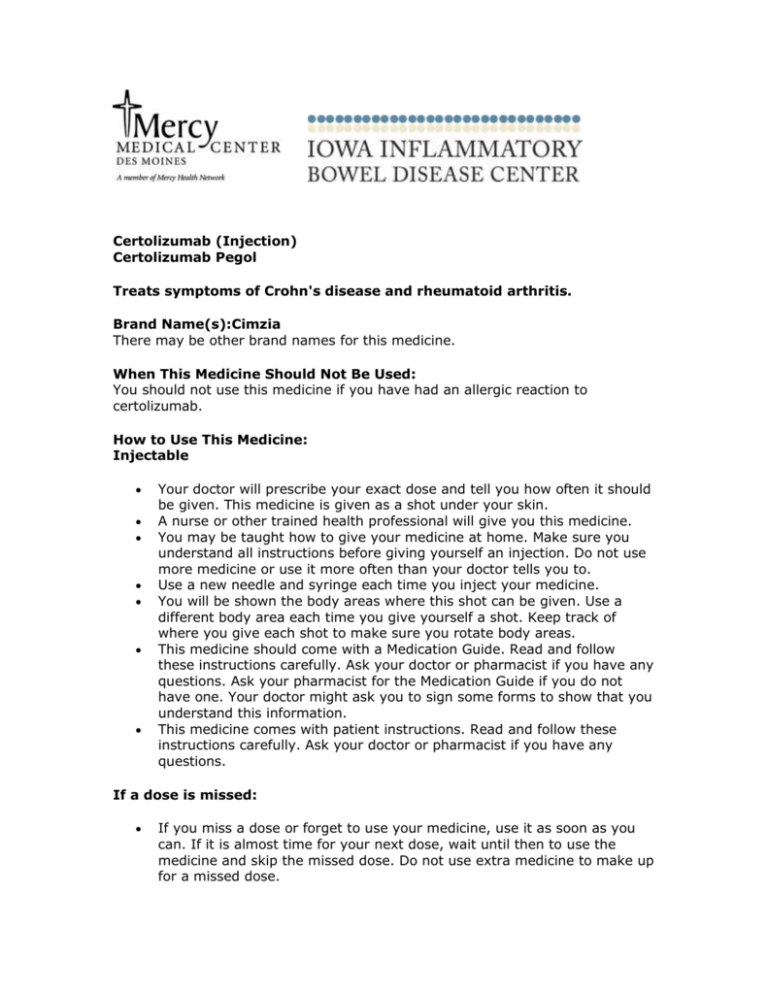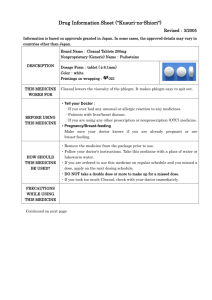
Certolizumab (Injection)
Certolizumab Pegol
Treats symptoms of Crohn's disease and rheumatoid arthritis.
Brand Name(s):Cimzia
There may be other brand names for this medicine.
When This Medicine Should Not Be Used:
You should not use this medicine if you have had an allergic reaction to
certolizumab.
How to Use This Medicine:
Injectable
Your doctor will prescribe your exact dose and tell you how often it should
be given. This medicine is given as a shot under your skin.
A nurse or other trained health professional will give you this medicine.
You may be taught how to give your medicine at home. Make sure you
understand all instructions before giving yourself an injection. Do not use
more medicine or use it more often than your doctor tells you to.
Use a new needle and syringe each time you inject your medicine.
You will be shown the body areas where this shot can be given. Use a
different body area each time you give yourself a shot. Keep track of
where you give each shot to make sure you rotate body areas.
This medicine should come with a Medication Guide. Read and follow
these instructions carefully. Ask your doctor or pharmacist if you have any
questions. Ask your pharmacist for the Medication Guide if you do not
have one. Your doctor might ask you to sign some forms to show that you
understand this information.
This medicine comes with patient instructions. Read and follow these
instructions carefully. Ask your doctor or pharmacist if you have any
questions.
If a dose is missed:
If you miss a dose or forget to use your medicine, use it as soon as you
can. If it is almost time for your next dose, wait until then to use the
medicine and skip the missed dose. Do not use extra medicine to make up
for a missed dose.
How to Store and Dispose of This Medicine:
If you store this medicine at home, keep it in the refrigerator. Do not
freeze. Protect the medicine from direct light. Keep your medicine in the
original package until you are ready to use it.
Throw away used needles in a hard, closed container that the needles
cannot poke through. Keep this container away from children and pets.
Ask your pharmacist, doctor, or health caregiver about the best way to
dispose of any leftover medicine, containers, and other supplies. You will
also need to throw away old medicine after the expiration date has
passed.
Keep all medicine away from children and never share your medicine with
anyone.
Drugs and Foods to Avoid:
Ask your doctor or pharmacist before using any other medicine,
including over-the-counter medicines, vitamins, and herbal products.
Make sure your doctor knows if you are also using azathioprine
(Imuran®) or methotrexate (Rheumatrex®). This medicine should not be
used together with abatacept (Orencia®), adalimumab (Humira®),
anakinra (Kineret®), etanercept (Enbrel®), infliximab (Remicade®),
natalizumab (Tysabri®), or rituximab (Rituxan®).
Talk to your doctor before getting flu shots or other vaccines while you
are receiving this medicine. Vaccines may not work as well, or they could
make you ill while you are using this medicine.
Warnings While Using This Medicine:
Make sure your doctor knows if you are pregnant or breastfeeding, or if
you have kidney disease, liver disease, cancer, congestive heart failure,
blood problems, diabetes, psoriasis, or any type of infection, including
hepatitis B, HIV, tuberculosis, or an infection that would not go away or
keeps coming back. Tell your doctor if you have problems with your
immune system, multiple sclerosis, epilepsy, or a similar nervous system
disease. Also tell your doctor if you are scheduled for any surgery.
You will need to have a skin test for tuberculosis before you start using
this medicine. Tell your doctor if you or anyone in your home has ever
had a positive reaction to a tuberculosis test or been exposed to
tuberculosis.
This medicine lowers the number of some types of blood cells in your
body. Because of this, you may bleed or get infections more easily. To
help with these problems, avoid being near people who are sick or have
infections. Wash your hands often. Stay away from rough sports or other
situations where you could be bruised, cut, or injured. Brush and floss
your teeth gently. Be careful when using sharp objects, including razors
and fingernail clippers.
Call your doctor right away if you start to have a persistent cough, weight
loss, night sweats, shortness of breath, fever, chills, unusual tiredness or
weakness, or flu-like symptoms such as a runny or stuffy nose, headache,
or feeling generally ill. These may be signs that you have an infection.
Your risk of getting an infection increases when you travel to places where
certain organisms (such as fungi, bacteria, viruses, or parasites) are more
common. Tell your doctor where you live and if you have any history of
travel if you start having any signs of infection.
This medicine may cause other unwanted effects that may not occur until
months or years after this medicine is used. A small number of people
(including children and teenagers) who have used this medicine have
developed certain types of cancer. Some patients also developed a rare
type of cancer called lymphoma. Talk with your doctor if you have unusual
bleeding, bruising, or weakness; swollen lymph nodes in the neck,
underarms, or groin; or unexplained weight loss. Also, check with your
doctor right away if your skin has red, scaly patches, or raised bumps that
are filled with pus.
This medicine may cause a serious allergic reaction. Check with your
doctor right away if you have a rash; itching; swelling of the face, tongue,
and throat; trouble with breathing; or chest pain after you get the
injection.
Some people who have used this medicine developed lupus-like symptoms
during treatment and got better after this medicine was stopped. Make
sure your doctor knows if you start having chest pains, shortness of
breath, joint pain, or a rash on your cheeks or arms that is sensitive to
the sun.
Do not change or stop using this medicine without checking with your
doctor first. Your doctor may want you to gradually reduce the amount
you are using before stopping it completely.
Your doctor will need to check your blood at regular visits while you are
using this medicine. Be sure to keep all appointments.
Possible Side Effects While Using This Medicine:
Call your doctor right away if you notice any of these side effects:
Allergic reaction: Itching or hives, swelling in your face or hands, swelling
or tingling in your mouth or throat, chest tightness, trouble breathing.
Blistering, peeling, or red skin rash.
Bone pain.
Change in how much or how often you urinate, or painful urination.
Chest pain, shortness of breath, cold sweat, and bluish-colored skin.
Dark-colored urine or pale stools.
Eye pain or any change in vision.
Fast or uneven heartbeat.
Fever, chills, cough, runny or stuffy nose, sore throat, and body aches.
Lightheadedness, dizziness, or fainting.
Lumps on your neck, armpits, or groin.
Mood or behavior changes, or thoughts of hurting yourself or others.
Raised bumps on the skin filled with pus.
Red, scaly patches on the skin.
Swelling in your hands, ankles, or feet.
Swollen lymph nodes in the neck, underarms, or groin.
Unexplained weight loss.
Unusual bleeding, bruising, or weakness.
Yellowing of your skin or the whites of your eyes.
If you notice these less serious side effects, talk with your doctor:
Joint pain.
Mild skin rash or itching.
Nausea, vomiting, diarrhea, or stomach pain.
Redness, pain, or swelling where the shot was given.
If you notice other side effects that you think are caused by this
medicine, tell your doctor.
Call your doctor for medical advice about side effects. You may report
side effects to FDA at 1-800-FDA-1088
© 1974-2010 Thomson Reuters. All rights reserved.
Certolizumab (Injection) (Injectable) - DrugNote, English
Printed on Tuesday, March 16, 2010 11:01:25 AM Tuesday, March 16,
2010 4:01:24 PM GMT






